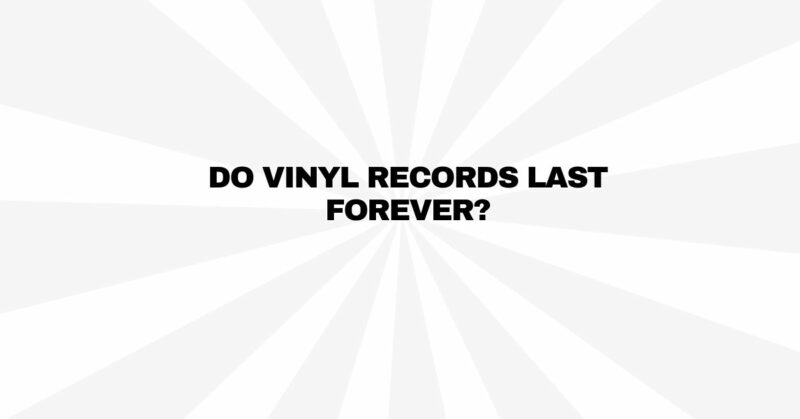Vinyl records have long been celebrated for their durability and ability to withstand the test of time. However, the notion that vinyl records last forever is a subject of debate and scrutiny among collectors, audiophiles, and preservationists. In this article, we will explore the lifespan of vinyl records, the factors that influence their longevity, and best practices for preserving and extending the life of your vinyl collection.
The Myth of Vinyl’s Permanence:
Vinyl records are often seen as more durable than their predecessor, shellac records, which were prone to breakage. Vinyl’s flexibility and resilience made it a significant improvement in the world of recorded music. Yet, the claim that vinyl records last forever is a misconception. While they are indeed robust, several factors can affect their longevity.
Factors Influencing Vinyl Record Longevity:
- Handling and Care:
- How a vinyl record is handled and cared for has a significant impact on its lifespan. Mishandling, such as dropping or mishandling records, can lead to scratches, warping, and other forms of damage. Regularly cleaning records and keeping them free of dust and debris is crucial for preservation.
- Storage Conditions:
- Proper storage conditions are vital for vinyl record preservation. Records should be stored vertically, away from direct sunlight, extreme temperatures, and high humidity. Prolonged exposure to these elements can lead to warping, mold growth, and deterioration of the record sleeve.
- Playback Equipment:
- The quality of playback equipment also affects the lifespan of vinyl records. A well-maintained turntable with a high-quality stylus and tonearm will exert minimal wear on records. In contrast, a poorly calibrated or worn-out stylus can cause groove wear and damage over time.
- Playback Frequency:
- Repeated playback of a vinyl record can lead to groove wear and eventual loss of audio fidelity. The more a record is played, the greater the potential for wear, so collectors often make use of “listening copies” for frequent playback to preserve their more valuable records.
- Environmental Factors:
- Environmental factors such as pollutants, smoking, and airborne contaminants can settle on the surface of records and cause damage. Smoking near a vinyl collection can lead to yellowing and staining of album covers.
- Pressing Quality:
- The quality of the vinyl pressing itself can vary. Records pressed with poor-quality vinyl or during periods of vinyl shortages may be more prone to warping and degradation.
Preservation Techniques:
To extend the life of your vinyl collection, consider the following preservation techniques:
- Proper Cleaning: Regularly clean your vinyl records using an antistatic brush or a record cleaning machine. Ensure the stylus on your turntable is clean to prevent contamination from the record’s surface.
- Correct Storage: Store your records vertically in protective inner sleeves and outer polythene or polypropylene sleeves to prevent dust and debris from settling on the surface.
- Maintain Playback Equipment: Keep your turntable and stylus in good condition. Replace the stylus when it shows signs of wear, and ensure the tonearm is correctly calibrated to minimize tracking force.
- Limited Playback: If you have rare or valuable records, consider making digital backups and playing those copies instead of the original vinyl to reduce wear.
The Lifespan of Vinyl Records:
While vinyl records can remain in excellent condition for decades when properly cared for, they are not immune to degradation. Some collectors have records that are over half a century old and still sound great. However, the ultimate lifespan of a vinyl record depends on numerous factors, including how well it has been maintained, how frequently it has been played, and the quality of the pressing.
It’s important to remember that vinyl records are not indestructible, and they will not last indefinitely without care. Over time, even well-preserved records may exhibit signs of wear, such as light surface noise or minor groove wear.
In conclusion, while vinyl records are known for their durability and longevity when properly cared for, the idea that they last forever is a myth. Collectors and enthusiasts should take proactive steps to maintain their collections, including proper storage, cleaning, and regular maintenance of playback equipment. By doing so, you can ensure that your vinyl records continue to provide enjoyment for many years to come, even if they don’t last “forever” in the strictest sense.


